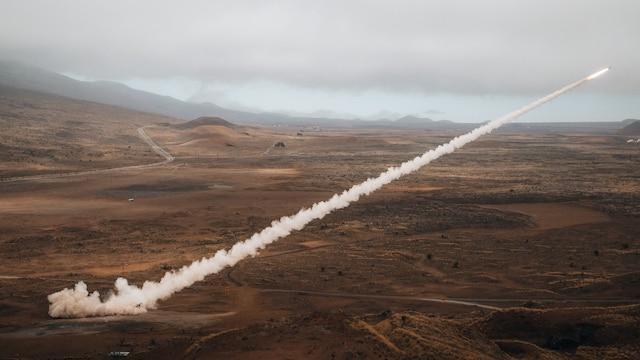러시아와 우크라이나가 SAM으로 서로 상대방의 항공기들이 하늘을 못쓰게 하는 'mutual air denial'을 해서 결국은 HIMARS같은 장거리 로켓/미사일이 더 큰 역할을 하고 있어
이것을 본 미국공군의 Hinote 장군은 대만 해협에서 미국이 하늘을 못쓰더라도 중국도 못쓰게만 하면 대만 침공을 막을 수 있다고 생각한다고 합니다.
The Weekly Debrief: Aerial Stalemate Over Ukraine Prompts U.S. Airpower Rethink
Steve Trimble September 06, 2022

Long-range artillery, including the U.S.-supplied High Mobility Artillery Rocket System, has had a greater impact in the Ukraine-Russia conflict than crewed combat aircraft.
Credit: U.S. Army
Traditional airpower has been absent nearly since the start of the ongoing war between Russia and Ukraine more than six months ago. Instead of fighters battling in the skies to achieve a level of air dominance that can be exploited by attack aircraft and bombers, both sides have settled for a state of mutual denial in the air.
“Neither Russia’s nor Ukraine’s manned aircraft can operate consistently or effectively near the front lines,” write Col. Maximillian Bremer, director of the Special Programs Division at Air Mobility Command, and Kelly Grieco, senior resident fellow at the Atlantic Council, in a newly published paper, “Air denial: The dangerous illusion of decisive air superiority.”
It may seem “mutual air denial” is anathema for U.S. Air Force war planners. Tactical air dominance is the fourth of seven operational imperatives adopted by Air Force Secretary Frank Kendall, and serves as justification for the tens of billions of dollars committed to the Next Generation Air Dominance program.
As the head of the Air Force Futures branch of the Air Staff, Lt. Gen. Clinton Hinote might be expected to uphold the principle of air dominance as a fundamental prerequisite of victory in any future air warfare.
But Hinote, speaking at a virtual Atlantic Council event on Sept. 6, thinks the mutual air denial scenario visible today in the Ukraine-Russia war is not a practical inevitability, but a strategy that makes more sense for any future conflict between the US and China or Russia.
“We are absolutely thinking about the concepts behind air denial,” Hinote said, responding to a question posed by Grieco.
A mutual air denial strategy may be the logical, best option for a U.S. strategy focused on maintaining the geopolitical status quo, Hinote said. In this case, the U.S. wants to deter China from invading Taiwan and Russia from attacking other countries in Europe. So this means maintaining the current state of affairs.
“We are proponents of the status quo. Our military capabilities ought to reflect that,” Hinote said. “There may be a sense that mutual denial is good for us. If that’s true, that ought to lead us to rethinking what types of capabilities we are fielding.”
Hinote’s remarks propose a new era in U.S. airpower strategy, which has been focused on gaining air superiority to attack at will the “centers of gravity” in another country’s military, political and economic infrastructure. The strategy was exemplified by Operation Desert Storm in 1991, which leveraged allied air superiority to cripple Iraqi defenses for a month ahead of three-day ground war. But a campaign against China and Russia is expected to be very different.
“What we have found in our war games is maybe that’s not what we need to do. … It may well be that mutual denial is good,” Hinote said.
In Chinese military publications, success in military operations is defined as superiority in air, maritime and information domains, he said. But the U.S. may not have to gain superiority against China in those domains to win. Since China is trying to change the status quo, simply denying them the ability to access those domains may be enough.
"If we can prove that we can mutually deny air, maritime and information domains, then a potential adversary never gets to the point where they willing to go [to war],” Hinote said.
Hinote stopped short of calling for specific changes to the Air Force’s modernization plans, but his denial-themed strategy offers an alternative path to achieving victory than with a limited number of exquisitely designed aircraft and expensively trained pilots. Ukraine and Russia have largely denied access to each other’s crewed combat aircraft over the front lines with layers of long-, medium-, and short-range air defense missiles.
“The barriers to entry to denying the use of airspace are much, much lower these days than the barriers to entry for extending control,” Hinote said.
댓글
댓글 리스트-
작성자엽군 작성시간 22.09.09 https://www.rand.org/pubs/research_reports/RR1051.html 여기 보면, PAC3가 검토 옵션에 포함되어 있죠. ㅋㅋㅋ. 그런데 미제나 타이완제 지대공 미사일들은 러시아나 중국제보다 사거리가 짧아서 효과가 떨어지는 문제는 쏙 빼고 이야기하는 듯 합니다.
-
작성자Minowski(김유철) 작성시간 22.09.09 전체적으로 같은 면적에다 쏟아부을 수 있는 있는 투사체의 양과 밀도에 현격한 차이가 있는데 너무 우크라이나 전황에 끼워맞춘 해석같습니다.
-
답댓글 작성자백선호 작성자 본인 여부 작성자 작성시간 22.09.10 폭탄/미사일 사용량, 면적, 시간과 이것이 승패에 미치는 영향은 자세히 연구할 필요가 있는 주제인 것 같습니다.
